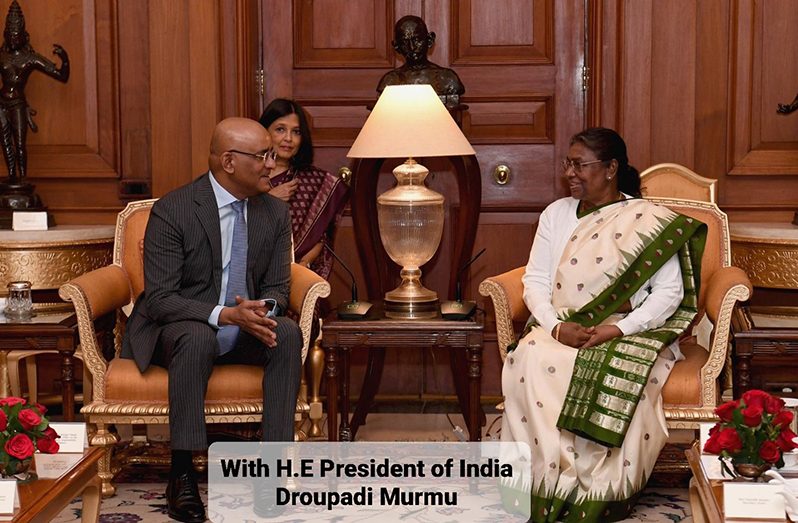–other major areas in Guyana on Indian investors’ radar
THE rapid transformation of Guyana and resultant opportunities have caught the eyes of Indian investors who are interested in capitalizing on areas of agriculture, manufacturing, healthcare, e-governance initiatives, energy and other crucial areas.
The interests of stakeholders in both public and private enterprises were shared with Vice-President, Dr. Bharrat Jagdeo, who led a high-level team to India to advance discussions on bilateral co-operation.
This visit was seen as a continued engagement between the two countries after the official visit of President, Dr. Mohamed Irfaan Ali to India last month.
According to a release from the Indian High Commission, the visit “heralded a further galvanization of ties” between the two countries, as the Vice-President met with the President of India Smt. Droupadi Murmu, Vice-President of India Shri Jagdeep Dhankhar, and important Cabinet ministers. He also participated in the World Sustainability Development Summit organized by TERI in New Delhi.
Jagdeo met with the Indian President at the Rashtrapati Bhavan (Presidential Palace of India), where discussions were held on the bilateral engagements and ways to strengthen the bilateral partnership between the two countries.
“The President of India stressed on the high importance that India attaches to its relations with Guyana owing to the shared heritage, culture and historic backgrounds and stressed the need to further diversify the bilateral trade between the two countries. Indian President Droupadi Murmu also expressed confidence that the visit of Vice President Jagdeo would further deepen historical assets of friendship between India and Guyana,” the release said.
Meanwhile, Shri Dhankhar and Vice-President Jagdeo had strong discussions on strategies to strengthen bilateral partnerships in various sectors including petroleum and natural gas, agriculture, agro-processing, education, healthcare, capacity building, renewable energy, ICT and climate change.
Both leaders appreciated the close and cordial relations shared by India and Guyana based on strong people-to-people ties, economic linkages and commonalities of approach on multilateral issues.

Jagdeo also had a meeting with India’s External Affairs Minister, Dr. S Jaishankar, during which talks were centred on the historical relationship between the two countries and greater opportunities in partnership, especially in trade, energy, agriculture, skills and people-to-people ties.
Both agreed that greater frequency of India-CARICOM ties could further “galvanize ties” between India and the region. The two leaders also discussed India’s current Presidency of the G-20 to address major issues related to the global economy, such as climate change mitigation and sustainable development.
Dr. Jaishankar assured Jagdeo that concerns of the Global South which includes Guyana and other Caribbean nations would be strongly represented during India’s G-20 Presidency.
During the Vice-President’s engagement with India’s Minister of Agriculture and Farmers Welfare Narendra Singh Tomar, various agriculture-related issues were discussed including the rice, sugarcane, coconuts, agro-processing, aquaculture, fisheries, dairy, livestock sectors, among other things.
India’s Minister of Petroleum and Natural Gas Hardeep Singh Puri also highlighted several matters of mutual interest and discussed matters pertaining to the entire energy chains including participation in energy assets, commitment for long-term off-take and capacity building initiatives in the oil and gas sector of Guyana.
The Indian Health and Family Welfare Minister Mansukh Mandaviya and the Vice-President discussed various issues of bilateral importance in the health sector, including the creation of manufacturing hubs of vaccines, therapeutic and hand-holding and training of the medical workforce.
Minister Mandaviya shared with the Vice-President India’s insights on the successful implementation of the Pradhan Mantri Bhartiya Janaushadi Pariyojna (PMBJP) which supplies high-quality, low-cost, generic medicines to the people of India.
Collaboration in ensuring affordable medicines through PMBJP and promoting Ayurveda in Guyana was also discussed.
Partnerships to strengthen collaboration to improve skills and capacity building in the vital agricultural sector of Guyana and the promotion of bilateral trade between the two countries in the agricultural sector were also explored.
The Cabinet of India on February 22 approved the Air Services Agreement between India and Guyana which would come into force after the exchange of the diplomatic notes between the two parties, confirming that each side has completed the internal procedures for coming into force of the agreement.
The signing of such an agreement between India and Guyana will enable a framework for the provision of air services between the two countries.
“Overall, the official visit of Dr. Jagdeo was appreciated at various levels and could pave the way for increasing momentum in bilateral relations while reflecting a new energy,” the release said.
Meanwhile, in a televised interview with some Indian media channels and news outlets, Dr. Jagdeo spoke about the reasons why India’s assistance and “its great technical skills” could help define the growth of the industry of both oil and gas, especially as Guyana moves to develop a gas policy and to start utilising the gas resources in terms of environmental management, and building capacity across the country.
The Vice-President thanked the Government of India for all the hospitality and attention to the delegation and its interest in building partnerships.
He also spoke at length about India’s leading role as an independent global voice with a more nuanced position on issues of development.
He also praised Indian Prime Minister Modi for the strength of his character and his policies to make enormous advances in various sectors of India for creating Indian stature globally.
Jagdeo had also expressed his appreciation for India’s willingness to represent the interests not only of its own but that of the “Global South” including small countries, like Guyana.




.jpg)









